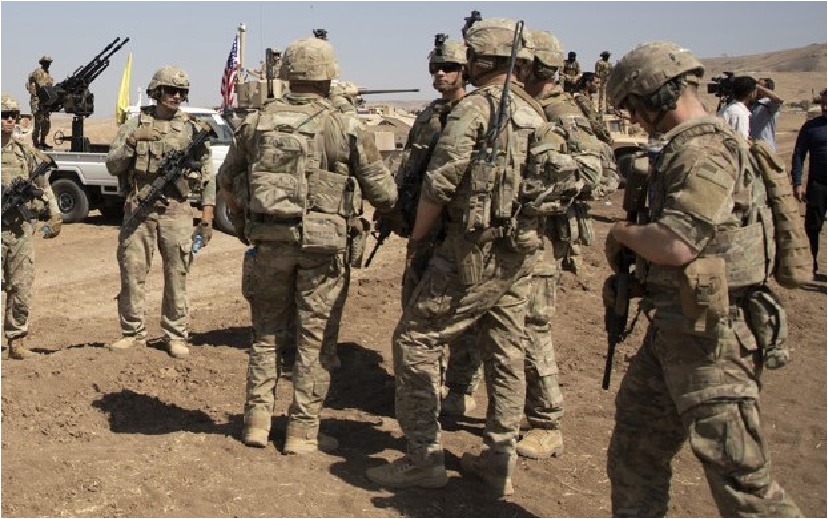
New York: Facing uncertainty in Syria after the rapid overthrow of Bashar al-Assad, Washington bombed sites controlled by Islamic State, a group on the terrorist list, as President Joe Biden’s administration tried to recalibrate its policy for that country.
The US faces a quandary because the rebels who have captured Damascus and sent al-Assad into exile in Russia are led by an organisation that is also listed as terrorist, Hayat Tahrir al-Sham (HTS), for its al-Qaeda link.
While celebrating the fall of al-Assad, Biden addressed the “risk and uncertainty” in Syria to Washington and the region and the initial US response.
“Just today, US forces conducted a dozen precision strikes, airstrikes, within Syria targeting ISIS camps and ISIS operatives”, he said.
“We’re clear-eyed about the fact that ISIS will try to take advantage of the vacuum. We will not let that happen,” he said.
However, reflecting the US’ dilemma, he added, “Make no mistake, some of the rebel groups that took down Assad have their own grim record of terrorism and human rights abuses.”
The end of al-Assad’s 14-year rule, he said, is “a moment of historic opportunity for the long-suffering people of Syria to build a better future for their proud country”.
He added, “It’s also a moment of risk and uncertainty”.
The risks are both internal and international as Syria shares borders with Iraq, Turkiye, Jordan, Lebanon, and Israel in a volatile region.
About 200 Indian peacekeepers from the United Nations Disengagement Observer Force (UNDOF) are stationed on the Syria-Israel border.
The US has deployed about 1,000 troops in areas that were outside the control of al-Assad mainly training Kurdish rebels fighting the Islamic State, which is known as ISIS, an acronym for its full name.
Biden said that the US troops will remain there and the detention facilities for ISIS terrorists will stay.
The US Central Command (CENTCOM) said in a press release that over 75 “strikes against the ISIS leaders, operatives, and camps were conducted as part of the ongoing mission to disrupt, degrade, and defeat ISIS”.
General Erik Kurilla, who commands CENTCOM put other organisations there on notice: “All organisations in Syria should know that we will hold them accountable if they partner with or support ISIS in any way”.
Biden, whose strategic leadership was questioned after the debacle of US withdrawal from Afghanistan last year, took credit for the weakening of Russia, Iran, and Hezbollah that led to al-Assad’s rout.
“Over the last week, their support collapsed, all three of them, because all three of them are far weaker today than they were when I took office”, he said.
He credited the “blows” inflicted by Ukraine on Russia and Israel on Hezbollah with US help.
“Our approach has shifted the balance of power in the Middle East”, he said.
Russia, bogged down in Ukraine and Iran that has taken a pounding from Israel could not help al-Assad.
Biden said al-Assad’s “regime brutalised and tortured and killed literally hundreds of thousands of innocent Syrians” and he should be brought to justice.
HTS leader Abu Mohammed al-Golani is also on the US terror list, but he has declared he has ended his ties to al-Qaeda from whose Nusrah Front it evolved.
Questions remain on how far the Sunni HTS will go in enforcing extreme Islamic rules and how it will treat non-Sunni Muslims like the Shias and the Alwaites, and other religious minorities like Christians.
Secretary of State Antony Blinken said, “We have taken note of statements made by rebel leaders in recent days, but as they take on greater responsibility, we will assess not just their words, but their actions”.
There is also the risk of the upheaval spilling into neighbouring countries.
Biden said that the US would help them “should any threat arise from Syria during this period of transition”.
Although NATO member Turkiye was aligned with the US seeing al-Assad gone, it’s motives run counter to the US.
While Washington supports the Kurdish minority in Syria, Ankara is against them because of its own problems with Kurds in Turkey who seek independence.
Defence Secretary Lloyd Austin spoke with Turkey’s Defence Minister Yasar Guler to discuss Syrian developments.
Austin “acknowledged Turkiye’s legitimate security concerns” while discussing the dangers from ISIS, the Pentagon said.
They reaffirmed the importance of coordination to “avoid any risk to US forces and partners, and the Defeat-ISIS Mission”, it said.
–IANS
